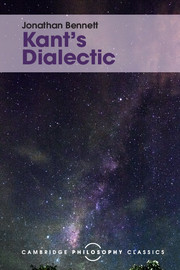Book contents
- Frontmatter
- Contents
- Preface to this edition by Karl Ameriks
- Preface
- System of references
- 1 Introduction
- 2 Concepts and intuitions
- 3 Substances and reality
- 4 The substantiality of the soul
- 5 The simplicity of the soul
- 6 The identity of the soul
- 7 Infinity
- 8 Limits
- 9 Divisibility
- 10 Freedom
- 11 God
- 12 Reason
- Index
5 - The simplicity of the soul
Published online by Cambridge University Press: 05 July 2016
- Frontmatter
- Contents
- Preface to this edition by Karl Ameriks
- Preface
- System of references
- 1 Introduction
- 2 Concepts and intuitions
- 3 Substances and reality
- 4 The substantiality of the soul
- 5 The simplicity of the soul
- 6 The identity of the soul
- 7 Infinity
- 8 Limits
- 9 Divisibility
- 10 Freedom
- 11 God
- 12 Reason
- Index
Summary
The soul as simple
The second paralogism is less elusive. Descartes and Leibniz did both say that souls are simple, non-composite, indivisible, without parts; and Kant can plausibly trace this view to facts about the Cartesian basis, and can fairly warn against inflation.
Kant sees ‘The soul is simple’ as arising as follows. Within the Cartesian basis, the notion of a composite – or of a thing with parts – is the notion of several items which I somehow apprehend or think as a unity by interrelating them in a suitable way. So my basic notion of compositeness is that of several items which I somehow unite; and this pre-requires myself, my intellectually or perceptually uniting self, to combine the items into a whole. So I cannot apply the notion of a composite to myself: ‘Although the whole of the thought could be divided and distributed among many subjects, the subjective “I” can never be thus divided and distributed, and it is this “I” that we presuppose in all thinking.’ In the paralogism itself, the crucial fact about the soul or thinking ‘I’ is said to be that it ‘can never be regarded as the concurrence of several things acting’, and this is just because the soul or thinking ‘I’ must do any ‘regarding’ that occurs.
Let us see how the simplicity of the soul figures in the writings of Descartes and Leibniz – but not Spinoza, for he thought that the soul is complex. Descartes sometimes writes as though he based the simplicity thesis on self-observation: ‘When I consider the mind, that is, when I consider myself in so far as I am just a thing that thinks, I can distinguish in myself no parts, but know and clearly conceive myself to be a thing single and entire.’ That seems a poor basis for confidence that all souls are simple, and one may reasonably guess that Descartes had something better in mind than mere introspection.
Elsewhere, he puts it differently. ‘The mind cannot be conceived except as indivisible’, Descartes says, because ‘we are not able to conceive of the half of any mind.’ The position is now based not upon introspectible simplicity, but upon the unintelligibility of the notion of a half-mind.
- Type
- Chapter
- Information
- Kant's Dialectic , pp. 82 - 93Publisher: Cambridge University PressPrint publication year: 2016

